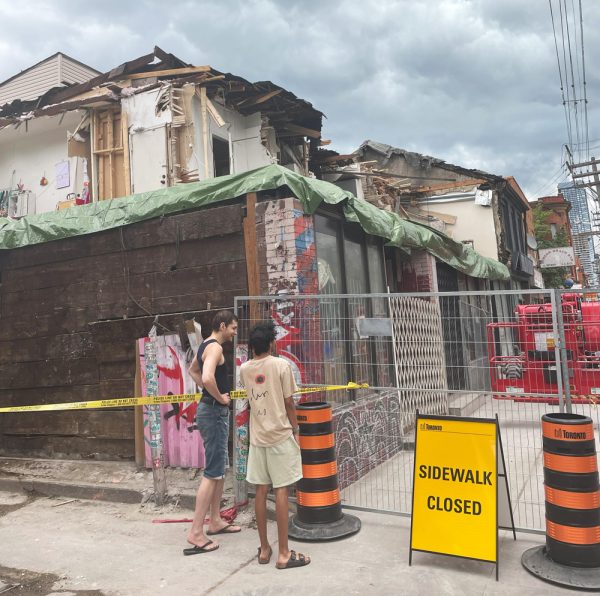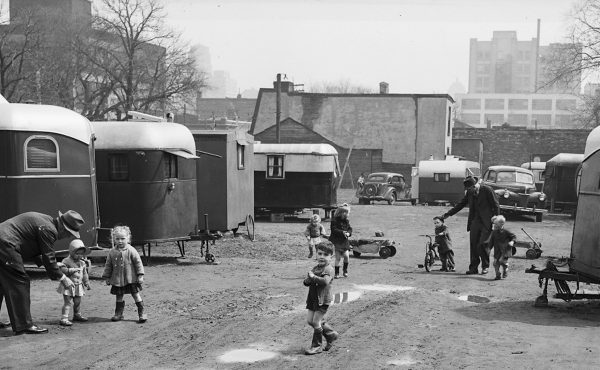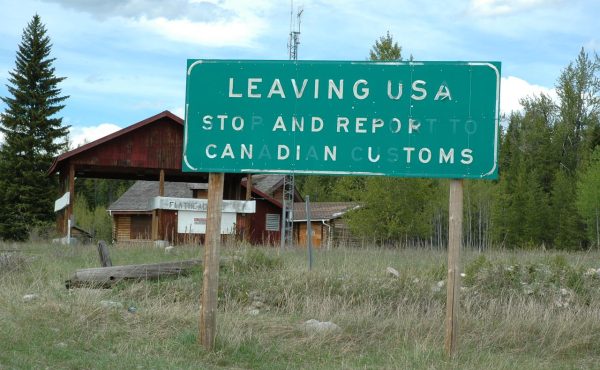Like a lot of Kensington residents, when I walk by the metal hoarding around the collapsed buildings at 606-614 Dundas West, I feel a mixture of grief and rage. The sight of the roof torn off, the disconcerting intimacy of the view into our neighbours’ homes, the boarded up corner store where I used to grab milk … it all breaks my heart, and I can only imagine what it means for my neighbours who have lost their homes and their belongings. How will they ever find another place to live in this tight rental market?
The losses were all preventable had the City followed through on its own work orders. And it could have been so much worse. By sheer luck no-one was injured or killed, but the damage is profound: 22 people lost their homes; at least three people lost their businesses; employees lost their jobs. The neighbourhood has lost our neighbours, affordable hair salons, and groceries.
The only ones who stands to gain from all this are the property owners, who, having extracted years of rent from substandard housing and commercial space, can now sell the land to a developer for more money than ever – because the biggest obstacle to redevelopment isn’t the cost of demolition, it’s getting rid of long-term tenants. In this case, the street is halfway to redevelopment, with three tear-downs and no tenants left. There’s some cold comfort in knowing that provincial policy dictates the units be replaced at a similar cost, and maybe the tenants will sue. But the fact is, neglect can be quite profitable.
The Kensington Market Community Land Trust looked at 614 Dundas when it was for sale in 2021 (for $2.2 million), but we didn’t dig into the details of it: it was clear from a quick visit that the housing was irregular, the building in bad shape. There was no way to buy it without displacing tenants, and we couldn’t come up with the finances to repair it for them to return. There was too much liability. Toronto’s excellent MURA program doesn’t cover the cost of this kind of major renovation, though it should.
Deeply affordable units are often the result of landlord negligence that puts tenants at risk. These units must be protected and should be turned into non-market housing. The situation on Dundas is a warning that we can’t rely on for-profit landlords for affordable, and safe, rental housing.
The City has a tool at its disposal that it can and should use more actively: expropriation. Property owners who let their buildings fall into disrepair, who ignore work orders for years, whose neglect puts other buildings, tenants and passersby at risk, cannot expect to escape consequences. They should not be allowed to enrich themselves by ignoring their fundamental responsibilities.
The City should expropriate their properties, at a price that reflects the long-term negligence and the cost of returning them to good repair. These at-risk tenanted buildings should be given to community land trusts (CLTs) and non-profits to steward. It’s been done before, at 1495 Queen West for example, and other attempts have been made more recently, but despite calls from activists and a report from David Wachsmuth back in 2008, the City of Toronto still doesn’t have a policy that makes expropriation a tool to protect rental housing.
Some will say the cost is too high. But can we afford the costs — fire, police, re-housing tenants — associated with building collapse? Are we prepared to pay the human costs when a neglected building actually kills someone?
The province is expropriating whole streets for the Ontario line. We recognize the need for expropriation for necessary infrastructure. Surely, in a housing crisis, affordable rental units are necessary infrastructure. As a city, we need to take decisive action to protect vulnerable tenants and neighbouring buildings.
If a landlord doesn’t care enough about their tenants, their neighbours, and their neighbourhood to minimally invest in keeping their buildings safe, there are CLTs and non-profits who can and will step in. We just need the City to take action.
Dominique Russell is the co-chair of the Kensington Market Community Land Trust




